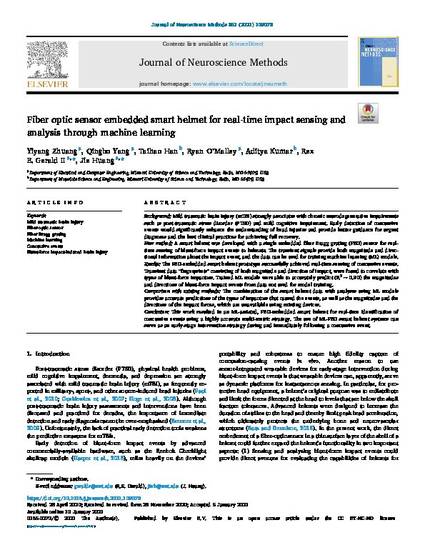
Background: Mild traumatic brain injury (mTBI) strongly associates with chronic neurodegenerative impairments such as post-traumatic stress disorder (PTSD) and mild cognitive impairment. Early detection of concussive events would significantly enhance the understanding of head injuries and provide better guidance for urgent diagnoses and the best clinical practices for achieving full recovery. New method: A smart helmet was developed with a single embedded fiber Bragg grating (FBG) sensor for real-time sensing of blunt-force impact events to helmets. The transient signals provide both magnitude and directional information about the impact event, and the data can be used for training machine learning (ML) models. Results: The FBG-embedded smart helmet prototype successfully achieved real-time sensing of concussive events. Transient data “fingerprints” consisting of both magnitude and direction of impact, were found to correlate with types of blunt-force impactors. Trained ML models were able to accurately predict (R2 ∼ 0.90) the magnitudes and directions of blunt-force impact events from data not used for model training. Comparison with existing methods: The combination of the smart helmet data with analyses using ML models provides accurate predictions of the types of impactors that caused the events, as well as the magnitudes and the directions of the impact forces, which are unavailable using existing devices. Conclusion: This work resulted in an ML-assisted, FBG-embedded smart helmet for real-time identification of concussive events using a highly accurate multi-metric strategy. The use of ML-FBG smart helmet systems can serve as an early-stage intervention strategy during and immediately following a concussive event.
- Blunt-Force Impact-Induced Brain Injury,
- Concussive Events,
- Fiber Bragg Grating,
- Fiber-Optic Sensor,
- Machine Learning,
- Mild Traumatic Brain Injury
Available at: http://works.bepress.com/jie-huang/166/

Army Research Laboratory, Grant W911NF-14-2-0034